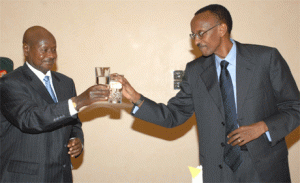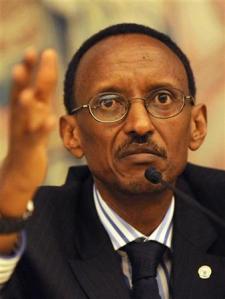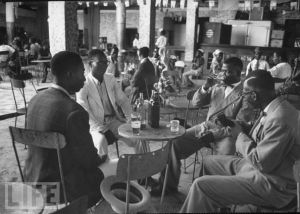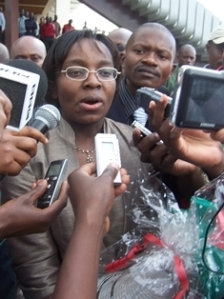Rwanda: Who Is bankrolling Victoire Ingabire’s Campaign?
In a series of comments generated by M. Christopher Vourlias’s article ‘How Free Is Free’ (http://postcardjunky.wordpress.com/2010/03/08/how-free-is-free/), Christopher Vourlias, alias “postcardjunky”, writes about the Rwandan political opponent Victoire Ingabire:
�Ingabire herself has repeatedly refused to answer questions related to the bankrolling of her campaign��.
‘Nzi Nink’ replies:
Did Kagame ever disclosed who is bankrolling his campaign? Why should Mrs. Ingabire be forced to so? Why don�t you ask the same question to Kagame who is using state money to finance his campaign and is getting rich from the resources of the Congo according to the UN report?
‘Nzi Nink’ comment – http://postcardjunky.wordpress.com/2010/03/08/how-free-is-free/#comment-147.
March 12, 2010 No Comments
Is Victoire Ingabire “the poster child” for the Western Press?
In an exchange of views between Geoffrey York and Christopher Vourlias about the Rwandan political opponent Victoire Ingabire, Geoffrey York writes:
Christopher Vourlias criticises Geoffrey York in these terms:
… The UN�s damning report on mineral and weapons trafficking in the Congo last year directly linked Ingabire�s UDF-INKINGI party to FDLR elements, and Ingabire herself has repeatedly refused to answer questions related to the bankrolling of her campaign. This is not something to gloss over � especially when your audience would most likely miss this point entirely.
The FDLR is considered a terrorist group by the UN; its ambitions for the eradication of the Tutsi people are widely known. By failing to draw this connection for your readers, you ignore one of the central points of dispute between the government and Ms. Ingabire. When she ruefully said, �I don�t know why the government is so afraid of me,� it would have been a good time to push her on the subject of her relationship to the FDLR. At the very least, it would have given her a chance to dispute the most damning accusations made against her in The New Times.
I agree that the Kagame government has a lot to answer for, especially in how it regards the opposition and the press. But I still feel Ingabire has a lot to answer for, too, even as she is being snatched up by the Western press as the poster child of the repressive Kagame regime.
Geoffrey York answers: March 9, 2010.
Chris � you�re being rather glib and facile when you describe her as �the poster child� for the Western press.
First of all, she is one of the major opposition leaders, like it or not. She is the only politician who is attacked daily in the New Times, suggesting that she is the leader who is most feared by the government. And as a Hutu leader, she is obviously the greatest threat to the RPF in an election. So it�s only logical that her campaign should be watched closely by any media.
We�re not creating her from nothing. She exists, and the RPF�s reaction to her is a fascinating story.
As for the UN report: look again. It�s a 99-page report which contains only 2 brief sentences about Ingabire. It basically says that she attended meetings where FDLR representatives were present.
I did, in fact, quiz her about this. (You are quite wrong to say that I gave her a �free pass� on this.) She says she organized an �inter-Rwandan dialogue� (which the UN report also confirms) and the dialogue was attended by representatives of all factions, including the RPF, not just FDLR.
The New Times is twisting this by claiming that Ingabire has been �blacklisted by the UN� and �put on the UN terrorist list� which is manifestly not true.
Now, is there evidence that some FDU members have some links to the FDLR? Perhaps there is, but I�ve seen nothing that directly implicates Ingabire personally for direct funding links to the FDLR. If you have such evidence, please cite it publicly, but I think you have to go beyond the UN report.
via How free is free? � This Is Africa.
See also our article:
Is Victoire Ingabire Connected To FDLR?
March 11, 2010 No Comments
Numbers of Tutsi and Hutu Victims of Rwandan War
In his article “How free is free” published on his blog, Christopher Vourlias presents the article of Geoffrey York: Rwanda�s blood-soaked history becomes a tool for repression as an “otherwise excellent piece”, but goes on to criticise the author in these terms:
How can you breezily write a sentence like this � �Ms. Ingabire says she doesn�t know how many Tutsis died in 1994, how many Hutus died, or even whether the number of Tutsi victims was larger than the number of Hutu victims.� � without mentioning that such a revisionist opinion contradicts a very large body of genocide scholarship? Should a journalist accept a statement like that at face value?
If knowing the number of victims on both sides is so important, it would be wise to consult those researchers who have already raised the question and who provided enough elements showing that Ingabire is right to say that she doesn’t know…
In fact, the answer to this question raised by Mr Vourlias is given by one commentator on Mr York’s article, who writes:
Mr. York’s article is headed in the right direction based on his limited research on the matter. I highly recommend that he reads a key scientific study by Professor Christian Davenport and Allan C. Stam. It would also be instructive for my York to watch this lecture by Professor Davenport at the University of Michigan.
In minute 31 of the video professor Stam demonstrates how the number of people killed in the Rwandan genocide were made up by Professor Seltzer of Fordham University. Professor Seltzer said he arrived at his figures (which are universally used and quoted)on the notion that an estimate of about or that at least 6 million died in the Holocaust was sufficient for the nuremberg prosecution. He goes on to say that he can no longer recall why he settled on his numbers.
In fact, as written on the fordschool.umich.edu website,
Allan Stam, Professor of Political Science and Faculty Associate at the Center for Political Studies and his colleagues drew from a number of data sources, and their conclusions call into question much of the conventional wisdom about the the violence.
They find that there were several forms of political violence being enacted at once (genocide, politicide, civil war, random violence and vendetta killings), that the extremist Hutu government as well as the Rwandan Patriotic Front engaged in violent activity against Rwandan citizens, and that the majority of victims were likely Hutu and not Tutsi.
These findings have implications for public policy, advocacy, humanitarian intervention as well as post-conflict reconstruction.
Coming to a New Understanding of the 1994 Rwanda Genocide
March 9, 2010 1 Comment
Strange Times in Kigali
Source: Christopher Vourlias – March 4, 2010.
I returned to Kigali this week with the hopes of enjoying some downtime before heading to eastern Congo. Sadly, this was not to be the case. As I recently reported, things in everyone�s favorite central African autocracy have taken a turn for the dysfunctional of late, even by this region�s strange standards. Grenade attacks, coup rumors, renegade generals on the run. If it weren�t for the fact that there�s not a beach in sight, I would�ve sworn I was back in Bujumbura.
Front and center has been the bizarre case of Lieutenant-General Kayumba Nyamwasa, a former army chief of staff who � after rumored sightings in Uganda � has apparently resurfaced in South Africa after fleeing the country last week. Kayumba, who was until recently serving as Rwanda�s ambassador to India, has had a strained relationship with the RPF leadership, after he was allegedly linked to a failed coup attempt in 2003. The diplomatic posting seems to reflect the conventional wisdom in Kigali, which is to keep your friends close, your enemies closer, and your failed-coup leaders in India. Uganda�s Sunday Vision reported on Kayumba�s contentious relationship with the government, citing local reports linking him to the troubled Green Party, as well as rumors that �no government official or even fellow soldiers attended the funeral of [Kayumba's] mother recently,� which is a dark tiding indeed for a Rwandan political figure.
Yesterday, a clearly peeved PK gave a press conference here in Kigali, at which he dispelled any rumors that the fleeing general � as well as another former army officer, Patrick Karegeya � had been plotting a coup against him, according to South Africa�s Independent.
�Nobody, absolutely nobody, not even Kayumba, can carry out a coup here. Think about it and you�ll come to the conclusion no one can carry out a coup� in Rwanda, the president said.
�People can only dream about it, wish for it; I believe what I�m telling you,� Kagame said.
Kagame went on to add: �Never ever ever ever ever. Never. Ever.�
The press conference comes on the heels of an announcement by the Prosecutor General Martin Ngoga, who told reporters with a straight face on Tuesday that the Kigali grenade attacks of last month have now been linked to none other than Lt. Gen. Kayumba Nyamwasa and Patrick Karegyeya. This comes after officials stated just hours after the attacks that two suspects had been apprehended, and that, in the definitive words of police spokesman Eric Kayiranga, �they belong to the Interahamwe militia.�
The Rwanda News Agency comments on the sudden about-face.
When three grenades exploded in Kigali two weeks ago and another in Huye district a week before, Police Spokesman Superintendent Eric Kayiranga quickly said investigations showed that Rwandan FDLR rebels were behind them.
The link has not been raised again. On Tuesday, the National Prosecuting Authority suddenly claimed that Gen. Kayumba Nyamwasa and Col. Patrick Karegeya were behind the grenade attacks. On Wednesday, President Kagame said the link between these two scenarios might be possible.
Why would former RPF stalwarts now be canoodling with the Interahamwe? Exactly how many FDLR Hutus do you think are on Lt. Gen. Faustin Kayumba�s Christmas-card list?
Undeterred by the hilarity of their accusations, the RPF today released photographic evidence that Messrs. Kayumba and Karegeya are, indeed, plotting with Interahamwe militia. �We finally have our smoking gun,� said Kagame.
The Kayumba saga comes against a backdrop of increasing intimidation and harassment of opposition politicians, as I�ve reported before. These have included threats most foul against at least three prominent opposition figures � Victoire Ingabire, of the FDU-Inkingi Party; Bernard Ntaganda, of the Parti Social-IMBERAKURI; and Frank Habineza, of the Democratic Green Party � and have (predictably) drawn outraged cries from the international community.
President Kagame, of course, has repeatedly defended his actions, citing the ever-present threat of Hutu rebels to the east and fifth columnists within. In an op-ed for The Guardian, Stephen Kinzer sums up the Kagame position.
He believes western human rights activists underestimate the prospects for a new outbreak of ethnic violence in Rwanda, as well as the danger of allowing ethnically charged speech. �We�ve lived this life,� he said angrily at a news conference. �We�ve lived the consequences. So we understand it better than anyone from anywhere else.�
The levels of intrigue here are�intriguing. Kagame is a master manipulator, who has repeatedly used the genocide as a pretext for bullying the international community and cracking down on internal dissent. The refrain of �we understand it better than anyone from anywhere else� has, in some form or other, become the de facto position of the Kagame administration. It is part of its us-against-the-world mentality, which has always included, as a lingering subtext, a reminder of how the West failed Rwanda during its darkest hour.
The president is a grand strategist, as PR-savvy as any American exec, and observers in this country are always forced to consider how a given event � whether it be grenade attacks in Kigali, or the return of a rabble-rousing exile � is being manipulated by the man upstairs. However damaging or threatening the latest news might seem, you know it is being redacted in His Excellency PK�s enigmatic noggin, before being regurgitated in a way that, ultimately, casts the Kagame regime in an ever more righteous light. Ingabire, for example, has been given a relatively free hand (by Rwandan standards) to state her case to the foreign press. But is Kagame simply holding back because the international spotlight is on her? Or is he playing a more patient hand, perhaps giving Ingabire enough rope to (metaphorically, of course) hang herself?
(The same laissez-faire attitude, unfortunately, has not been extended toward her erstwhile assistant, Joseph Ntawangundi, who just three days after being attacked alongside Ingabire, was promptly arrested and locked up on an outstanding warrant for crimes committed during the genocide.)
I�m not entirely sure what to make of these opposition leaders. Frank Habineza, President of the Democratic Green Party of Rwanda, for example, clumsily played the genocide card while appealing to the West to put pressure on Kagame for his repressive political tactics.
�We do not want the international community to wait, like it waited in 1994,� said Habineza, drawing a parallel that was unlikely to win him many fans. (You can hear more from Habineza here.)
And then there�s Ingabire. I�ve already written a bit about her political aspirations, after spending nearly 16 years in exile in Europe. The would-be president quickly stirred controversy by making some politically charged comments about Hutu victims at the genocide memorial. This more or less occurred while she still had crumbs from the in-flight meal on her chin.
Given such blatantly ethnic posturing � as well as some of the questionable figures looming in her background � it is hard to accept her intentions at face value. Likewise, the clumsy, stage-managed episode involving her supposed asylum request at the UK High Commission makes you wonder whether Ingabire isn�t as much a cool calculator as the man she hopes to dethrone. And you have to ask why someone so deeply concerned with the future of her country waited this long to return, anyway.
Recently Ingabire claimed that if the election were to be held tomorrow, the people would surely vote FDU into power, �because they know who we are.�
I don�t want to take anything away from the average man-on-the-collines here in Rwanda. I would like to give Rwandans � particularly the rural poor, who make up the bulk of this country�s population � the benefit of the doubt, and assume that, come August, they can and will calmly file to the polls with a selfless democratic spirit and full of only the highest of high-minded aspirations.
Unfortunately, that goes against everything I know about electoral politics in this region. Given the amount of time she has had to �campaign� in the country, I suspect most voters don�t know all that much about who Ingabire is. They simply know that she is a Hutu, and in a country where that group still holds a roughly 85 percent majority, she could very well be banking on the fact that that�s all they need to know. You can hardly blame the president, then, for being a bit concerned at the rumblings from below. And you have to wonder just what steps he might take in the next few months to suppress them.
March 7, 2010 No Comments





